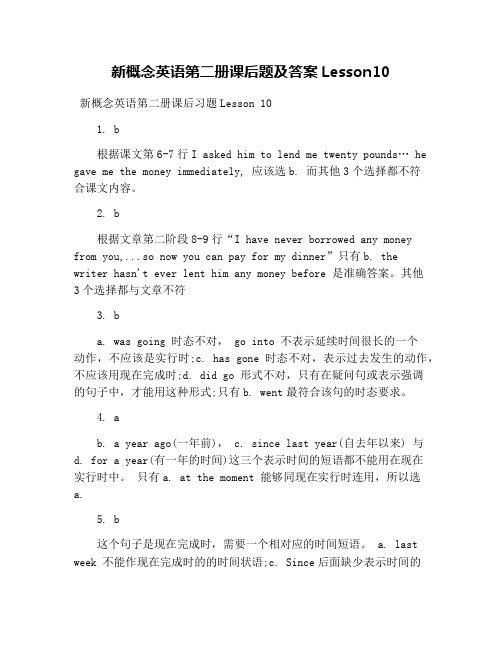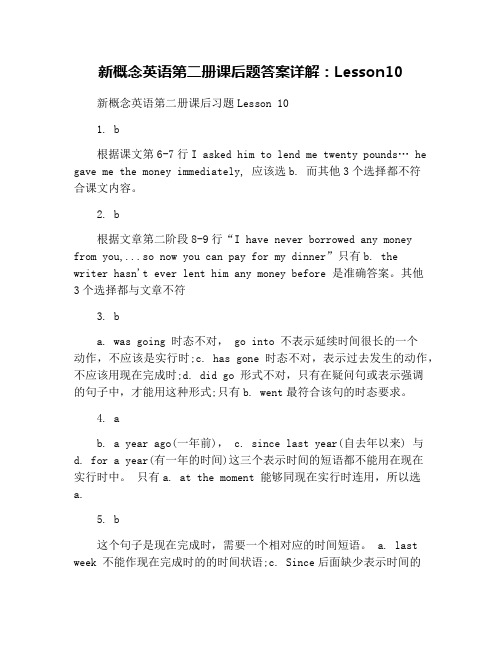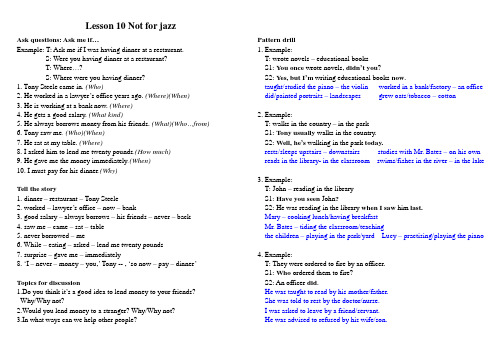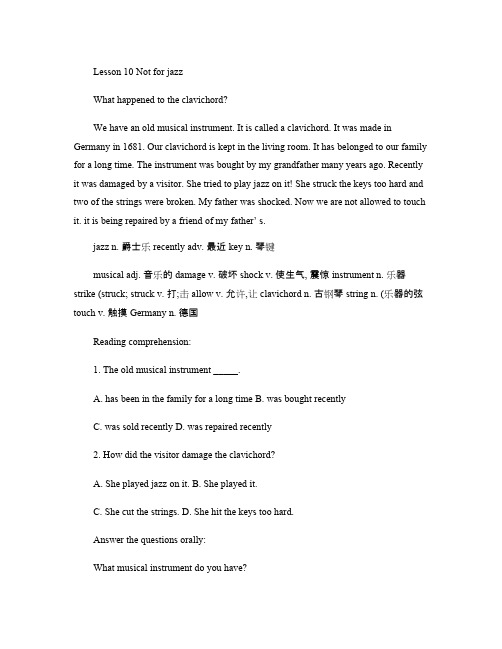(完整版)新概念英语第二册练习Lesson10.
新概念英语第二册课文+练习 Lesson 10

Lesson 10 Not for jazz 不适于演奏爵士乐We have an old musical instrument. It is called a clavichord. It was made in Germany in 1681. Our clavichord is kept in the living room. It has belonged to our family for a long time. The instrument was bought by my grandfather many years ago. Recently it was damaged by a visitor. She tried to play jazz on it! She struck the keys too hard and two of the strings were broken. My father was shocked. Now we are not allowed to touch it. It is being repaired by a friend of my father’s.Comprehension1 The old musical instrument ________(a) has been in the family for a long time (b) was bought recently(c) was sold recently (d) was repaired recently2 How did the visitor damage the clavichord(a) She played jazz on it. (b) She played it.(c) She cut the strings. (d) She hit the keys too hard. Structure3 Our c1avichord is kept in the living room. That’s where we ______ it.(a) kept (b) have kept (c) are keeping (d) keep4 It has belonged to our family for years. It’s the _______(a) families (b) families’(c) family’s (d) familys’5 The family have had the clavichord ______ many years.(a) since (b) for (c) from (d) by6 Who _______ it Grandfather did.(a) buy (b) was bought (c) bought (d) did buy7 We are not allowed to touch it. We ______ touch it.(a) mustn’t (b) mustn’t to (c) haven’t to (d) don’t have to Vocabulary8 What’s it ______ A clavichord.(a) told (b) said (c) called (d) spoken9 It’s kept in the living room. That’s where we _______ it.(a) have (b) hold (c) lift (d) carry10 The visitor damaged it. She _______ it.(a) hurt (b) pained (c) broke (d) destroyed11 Recently it was damaged. She damaged it ______(a) late (b) lastly (c) lately (d) finally12 A friend of my father’ s is ______ the clavichord.(a) mending (b) making (c) doing (d) buildingNew words and expressions 生词和短语jazz n. 爵士音乐musical adj. 音乐的instrument n. 乐器clavichord n. 古钢琴recently adv. 最近damage v. 损坏key n. 琴键string n. (乐器的)弦shock v. 使不悦或生气,震惊allow v. 允许,让touch v. 触摸。
新概念英语二册Lesson 10 Not for jazz

改为被动语态 His brother washes bowls every day.
主 谓 宾(受动者)
Bowls are washed by his brother every day.
在动词执行者无须说明或强调时,by短语可以省略。
不用被动语态的几种情况 • 1. 不及物动词没有被动语态
• Belong, happen, take place, last, come true, remain • succeed, fall, die, arrive等 • Great changes have taken place in this city. • This bike doesn’t belong to Mike.
The fish tastes good. The scarf feels 不能用被动语态。 • You must look after yourself. • 6.某些动词形式是主动, 但含有被动的意思。 • The books sell well. 这本书卖的很好。 • This kind of cloth washes very well. • 这种布很好洗。
Questions
• 1. Do we own an old clavichord, or do we own a new piano? • 2.When was it made? • 3. Who bought the instrument many years ago? • 4. Who damaged it recently? • 5. What did she try to do? • 6.What did she break? • 7. Who is repairing it now?
新概念英语第二册课后题及答案Lesson10

新概念英语第二册课后题及答案Lesson10新概念英语第二册课后习题Lesson 101. b根据课文第6-7行I asked him to lend me twenty pounds… he gave me the money immediately, 应该选b. 而其他3个选择都不符合课文内容。
2. b根据文章第二阶段8-9行“I have never borrowed any money from you,...so now you can pay for my dinner”只有b. thewriter hasn't ever lent him any money before 是准确答案。
其他3个选择都与文章不符3. ba. was going 时态不对, go into 不表示延续时间很长的一个动作,不应该是实行时;c. has gone 时态不对,表示过去发生的动作,不应该用现在完成时;d. did go 形式不对,只有在疑问句或表示强调的句子中,才能用这种形式;只有b. went最符合该句的时态要求。
4. ab. a year ago(一年前),c. since last year(自去年以来) 与d. for a year(有一年的时间)这三个表示时间的短语都不能用在现在实行时中。
只有a. at the moment 能够同现在实行时连用,所以选a.5. b这个句子是现在完成时,需要一个相对应的时间短语。
a. last week 不能作现在完成时的的时间状语;c. Since后面缺少表示时间的名词;d. A week ago 也不能做现在完成时的时间状语;只有b. Uptill now(到当前为止)能同现在完成时连用,所以选b.6. c问“多少钱”需要用表示不可数的疑问词来提问。
a. how many (多少)是对可数的事物或人提问的;b. how不能对名词(钱)提问,只能问方式或状态d. how few也不能对钱提问,只能修饰可数名词;只有c. how much 是针对不可数的事物提问的,问“多少钱”,只能用how much提问,所以选c.7. ca. want to 不合乎题目意思;b. want语法不对,也不符合题目意思;d. you want to 语序错误;只有c. want you to 最合乎语法和题目意思。
新概念英语第二册课后题答案详解:Lesson10

新概念英语第二册课后题答案详解:Lesson10新概念英语第二册课后习题Lesson 101. b根据课文第6-7行I asked him to lend me twenty pounds… he gave me the money immediately, 应该选b. 而其他3个选择都不符合课文内容。
2. b根据文章第二阶段8-9行“I have never borrowed any money from you,...so now you can pay for my dinner”只有b. thewriter hasn't ever lent him any money before 是准确答案。
其他3个选择都与文章不符3. ba. was going 时态不对, go into 不表示延续时间很长的一个动作,不应该是实行时;c. has gone 时态不对,表示过去发生的动作,不应该用现在完成时;d. did go 形式不对,只有在疑问句或表示强调的句子中,才能用这种形式;只有b. went最符合该句的时态要求。
4. ab. a year ago(一年前),c. since last year(自去年以来) 与d. for a year(有一年的时间)这三个表示时间的短语都不能用在现在实行时中。
只有a. at the moment 能够同现在实行时连用,所以选a.5. b这个句子是现在完成时,需要一个相对应的时间短语。
a. last week 不能作现在完成时的的时间状语;c. Since后面缺少表示时间的名词;d. A week ago 也不能做现在完成时的时间状语;只有b. Uptill now(到当前为止)能同现在完成时连用,所以选b.6. c问“多少钱”需要用表示不可数的疑问词来提问。
a. how many (多少)是对可数的事物或人提问的;b. how不能对名词(钱)提问,只能问方式或状态d. how few也不能对钱提问,只能修饰可数名词;只有c. how much 是针对不可数的事物提问的,问“多少钱”,只能用how much提问,所以选c.7. ca. want to 不合乎题目意思;b. want语法不对,也不符合题目意思;d. you want to 语序错误;只有c. want you to 最合乎语法和题目意思。
新概念英语第二册Lesson 10

New words
1.damage (v.)
/æ / /ɪ/ eg. damage the house damage his good name
3.allow (v.)
/ə/ /aʊ/
allow sb do sth be allowed to do sth
Lesson 10
新概念2
Review
1.小鸡们聚集在门口。 2.向某人喊叫/向某人喊 3.拒绝做某事 4.大笑/嘲笑某人 5.欢迎某人/欢迎去某地 6.一群…/一大群 7.时针/分针 8.在周三晚上 9.一年的最后一天 10.多长时间以后 11.20分钟以后 12. 11:55/ 12:11 13.开始做某事 14. ___8:25 ___ the morning ___ Wednesday morning ____2012 ____summer ____night ____noon ____Monday
Eg. musical instrument
Grammars
被动语态:
be + 动词的过去分词+by
1.He built the house . The house was built by him oy . The boy was punished by the teacher.
Eg.allow me to drive a car
2.shock (v.)
shock sb 使某人震惊 4.touch(v.) be shocked by 被震惊 eg.touch your head
eg.This thing shocked us. We were shocked by that thing .
(最新版) 新概念英语第二册Lesson--10-Not-for-Jazz

Lesson 10
v. 损害;损毁
damage指部分"损坏"、"损害"、"破坏"或指使用价值有所降低。它可以 用作动词,也可以用作名词,用作名词时常与to something 连用。例如: Hundreds of houses in the area were damaged by the storm. 暴风雨毁坏了这个地区数以百计的房屋。 The accident did a lot of damage to his car. 这次车祸使他的车受到很大的损坏
n.琴键
Lesson 10
n.弦
v.使不悦或生气; 震惊
v.允许
v.碰;触摸
Dream what u want to dream
[dʒæz] ['mju:zikəl] ['instrumənt] ['klævikɔ:d] ['ri:səntli] ['dæmidʒ] [ki:] [striŋ] [ʃɔk, ʃɑk] [ə'lau] [tʌtʃ]
jazz musical instrument clavichord recently damage key string shock allow touch
Lesson 10
爵士乐
a type of music with strong rhythms, in which the players often improvise (= make up the music as they are playing), originally created by African American musicians a jazz band 爵士乐队 a jazz club爵士乐俱乐部
新概念英语第二册口语练习Lesson 10

Lesson 10 Not for jazzAsk questions: Ask me if…Example: T: Ask me if I was having dinner at a restaurant.S: Were you having dinner at a restaurant?T: Where…?S: Where were you having dinner?1. Tony Steele came in. (Who)2. He worked in a lawyer’s office years ago. (Where)(When)3. He is working at a bank now. (Where)4. He gets a good salary. (What kind)5. He always borrows money from his friends. (What)(Who…from)6. Tony saw me. (Who)(When)7. He sat at my table. (Where)8. I asked him to lend me twenty pounds.(How much)9. He gave me the money immediately.(When)10. I must pay for his dinner.(Why)Tell the story1. dinner – restaurant – Tony Steele2. worked – lawyer’s office – now – bank3. good salary – always borrows – his friends – never – back4. saw me – came – sat – table5. never borrowed – me6. While – eating – asked – lend me twenty pounds7. surprise – gave me – immediately8. ‘I – never – money – you,’ Tony -- , ‘so now – pay – dinner’Topics for discussion1.Do you think it’s a good idea to lend money to your friends? Why/Why not?2.Would you lend money to a stranger? Why/Why not?3.In what ways can we help other people? Pattern drill1. Example:T: wrote novels – educational booksS1: You once wrote novels, didn’t you?S2: Yes, but I’m writing educational books now.taught/studied the piano – the violin worked in a bank/factory – an office did/painted portraits – landscapes grew oats/tobacco – cotton2. Example:T: walks in the country – in the parkS1: Tony usually walks in the country.S2: Well, he’s walking in the park today.rests/sleeps upstairs – downstairs studies with Mr. Bates – on his own reads in the library- in the classroom swims/fishes in the river – in the lake 3. Example:T: John – reading in the libraryS1: Have you seen John?S2: He was reading in the library when I saw him last.Mary – cooking lunch/having breakfastMr. Bates – tiding the classroom/teachingthe children – playing in the park/yard Lucy – practising/playing the piano 4. Example:T: They were ordered to fire by an officer.S1: Who ordered them to fire?S2: An officer did.He was taught to read by his mother/father.She was told to rest by the doctor/nurse.I was asked to leave by a friend/servant.He was advised to refused by his wife/son.Lesson 10 Not for jazzAsk questions: Ask me if…Example: T: Ask me if I was having dinner at a restaurant.S: Were you having dinner at a restaurant?T: Where…?S: Where were you having dinner?1. Tony Steele came in. (Who)2. He worked in a lawyer’s office years ago. (Where)(When)3. He is working at a bank now. (Where)4. He gets a good salary. (What kind)5. He always borrows money from his friends. (What)(Who…from)6. Tony saw me. (Who)(When)7. He sat at my table. (Where)8. I asked him to lend me twenty pounds.(How much)9. He gave me the money immediately.(When)10. I must pay for his dinner.(Why)Tell the story1. dinner – restaurant – Tony Steele2. worked – lawyer’s office – now – bank3. good salary – always borrows – his friends – never – back4. saw me – came – sat – table5. never borrowed – me6. While – eating – asked – lend me twenty pounds7. surprise – gave me – immediately8. ‘I – never – money – you,’ Tony --, ‘so now – pay – dinner’Topics for discussion1.Do you think it’s a good idea to lend money to your friends?Why/Why not?2.Would you lend money to a stranger? Why/Why not?3.In what ways can we help other people?Comprehension questions1. Where were you having dinner?2. Who came in?3. Did he once work in a lawyer’s office?4. How long ago was that?5. Where is he working now?6. Is he paid a good salary?7. What does he always do?8. Do you think he needs to borrow money?9. Does he ever pay it back?10. What did Tony do when he saw you?11. Have you ever lent him any money?12. Did you have dinner together?13. What did you ask him during dinner?14. What did he give you immediately?15. Were you surprised?16. Did he pay for the dinner?Pattern drill1. Example:T: wrote novels – educational booksS1: You once wrote novels, didn’t you?S2: Yes, but I’m writing educational books now.taught/studied the piano – the violin worked in a bank/factory – an office did/painted portraits – landscapes grew oats/tobacco – cotton2. Example:T: walks in the country – in the parkS1: Tony usually walks in the country.S2: Well, he’s walking in the park today.rests/sleeps upstairs – downstairs studies with Mr. Bates – on his own reads in the library- in the classroom swims/fishes in the river – in the lake 3. Example:T: John – reading in the libraryS1: Have you seen John?S2: He was reading in the library when I saw him last.Mary – cooking lunch/having breakfastMr. Bates – tiding the classroom/teachingthe children – playing in the park/yard Lucy – practising/playing the piano 4. Example:T: They were ordered to fire by an officer.S1: Who ordered them to fire?S2: An officer did.He was taught to read by his mother/father.She was told to rest by the doctor/nurse.I was asked to leave by a friend/servant.He was advised to refused by his wife/son.。
新概念英语第二册练习Lesson10.(可编辑修改版).

Lesson 10 Not for jazzWhat happened to the clavichord?We have an old musical instrument. It is called a clavichord. It was made in Germany in 1681. Our clavichord is kept in the living room. It has belonged to our family for a long time. The instrument was bought by my grandfather many years ago. Recently it was damaged by a visitor. She tried to play jazz on it! She struck the keys too hard and two of the strings were broken. My father was shocked. Now we are not allowed to touch it. it is being repaired by a friend of my father’ s.jazz n. 爵士乐 recently adv. 最近 key n. 琴键musical adj. 音乐的 damage v. 破坏 shock v. 使生气, 震惊 instrument n. 乐器strike (struck; struck v. 打;击 allow v. 允许,让 clavichord n. 古钢琴 string n. (乐器的弦touch v. 触摸 Germany n. 德国Reading comprehension:1. The old musical instrument _____.A. has been in the family for a long timeB. was bought recentlyC. was sold recentlyD. was repaired recently2. How did the visitor damage the clavichord?A. She played jazz on it.B. She played it.C. She cut the strings.D. She hit the keys too hard.Answer the questions orally:What musical instrument do you have?Was it old or new?What happened to it recently?How was it damaged?Is it being repaired now?Structure & vocabulary:1. Our clavichord is kept in the living-room. That’ s where we _____ it.A. keptB. have keptC. are keepingD. keep2. It has belonged to our family. It’ s the _____.A. familiesB. families’C. family’ sD. familys’3. The family have had the clavichord _____ many years.A. sinceB. forC. fromD. by4. Who _____ it? Grandfather did.A. buyB. was boughtC. boughtD. did buy5. We are not allowed to touch it. We _____ touch it.A. mustn’ tB. mustn’ t toC. haven’ t toD. don’ t have to6. What ’ s it _____? A clavichord.A. toldB. saidC. calledD. spoken7. It ’ s kept in the living-room. That’ s where we _____ it.A. haveB. holdC. liftD. carry8. The visitor damaged it. She _____ it.A. hurtB. painedC. brokeD. destroyed9. Recently it was damaged. She damaged it _____.A. lateB. lastlyC. latelyD. finally10. A friend of my father’ s is _____ the clavichord.A. mendingB. makingC. doingD. buildingKey structures:a--Who built the bridge? --When was this bridge built?--Prisoners of war built this bridge in 1942.This bridge was built by prisoners of war in 1942.b Read these pairs of sentences carefully. The first sentence in each pair tells us about a person. The second tells us about a thing.Workmen are building a new road outside my horse.A new road is being built outside my house.The newsagent delivers our papers every morning.Our papers are delivered every morning.The postman delivered a letter this morning.A letter was delivered this morning.c Read these sentences:The police arrested the thief. The thief was arrested (by the police.He gave me a present. I was given a present.The headmaster has punished the boy. The boy has been punished (by the headmaster.ExercisesA. Answer these questions on the passage. Write a complete answer to each question:1. What is our old musical instrument called?2. Where was it made?3. Where is it kept?4. When was it bought?5. When was it damaged?6. How many strings were broken?7. How did my father feel about this?8. What aren’ t we allowed to do?9. What is being done to the clavichord?B. change the form of the phrases in italics. Do not refer to the passage until you finish the exercise: We call it a clavichord.__________________________________________Someone made it in Germany in1681.__________________________________________ We keep our clavichord in the living room. __________________________________________ My grandfather bought the instrument many years ago. ___________________________________ Recently a visitor damaged it. __________________________________________She struck the keys too hard and broke two of the strings._________________________________ This shocked my father.__________________________________________Now he does not allow us to touch it.__________________________________________ A friend of my father’ s is repairing it. __________________________________________ Language points:A. be made inIt was made in Germany.be made ofThe tea pot is made of silver.be made fromBread is made from flour.be made byThis cake was made by my sister.Supply the correct words:1. Is your watch made ______ gold?2. These knives were made ______ Sheffield.3. This cake was made ______ sugar, flour, butter and eggs.4. The model plane was made ______ a group of students.B. a friend of my father’ s 双重所有格He is one of my father’ s friends. He is a friend of my father’ sTom lent me one of his books. Tom lent me a book of his.He is one of my friends. He is a friend _______ ________.Change the form of the phrases in italics:1. He borrowed one of my records. ____________________________________2. She showed me one of John’ s pictures.____________________________________3. It was one of her ideas. ____________________________________4. One of you letters was found on my desk.____________________________________5. Some of their friends came to see me.____________________________________Exercises:A . Rewrite the sentences and change the active voice into passive voice:1. These workmen are repairing my house.2. The police picked up the boy in the forest.3. The boy sends the newspaper to me every morning.4. They will take care of your grandmother.5. Mary wrote three books last year.6. She is washing your clothes.7. They are painting the wall.8. I am telling him how to be a good student.B. Translating:1. 这幢楼叫做“联谊大厦” (Union building。
- 1、下载文档前请自行甄别文档内容的完整性,平台不提供额外的编辑、内容补充、找答案等附加服务。
- 2、"仅部分预览"的文档,不可在线预览部分如存在完整性等问题,可反馈申请退款(可完整预览的文档不适用该条件!)。
- 3、如文档侵犯您的权益,请联系客服反馈,我们会尽快为您处理(人工客服工作时间:9:00-18:30)。
Lesson 10 Not for jazzWhat happened to the clavichord?We have an old musical instrument. It is called a clavichord. It was made in Germany in 1681. Our clavichord is kept in the living room. It has belonged to our family for a long time. The instrument was bought by my grandfather many years ago. Recently it was damaged by a visitor. She tried to play jazz on it! She struck the keys too hard and two of the strings were broken. My father was shocked. Now we are not allowed to touch it. it is being repaired by a friend of my father’ s.jazz n. 爵士乐 recently adv. 最近 key n. 琴键musical adj. 音乐的 damage v. 破坏 shock v. 使生气, 震惊 instrument n. 乐器strike (struck; struck v. 打;击 allow v. 允许,让 clavichord n. 古钢琴 string n. (乐器的弦touch v. 触摸 Germany n. 德国Reading comprehension:1. The old musical instrument _____.A. has been in the family for a long timeB. was bought recentlyC. was sold recentlyD. was repaired recently2. How did the visitor damage the clavichord?A. She played jazz on it.B. She played it.C. She cut the strings.D. She hit the keys too hard.Answer the questions orally:What musical instrument do you have?Was it old or new?What happened to it recently?How was it damaged?Is it being repaired now?Structure & vocabulary:1. Our clavichord is kept in the living-room. That’ s where we _____ it.A. keptB. have keptC. are keepingD. keep2. It has belonged to our family. It’ s the _____.A. familiesB. families’C. family’ sD. familys’3. The family have had the clavichord _____ many years.A. sinceB. forC. fromD. by4. Who _____ it? Grandfather did.A. buyB. was boughtC. boughtD. did buy5. We are not allowed to touch it. We _____ touch it.A. mustn’ tB. mustn’ t toC. haven’ t toD. don’ t have to6. What ’ s it _____? A clavichord.A. toldB. saidC. calledD. spoken7. It ’ s kept in the living-room. That’ s where we _____ it.A. haveB. holdC. liftD. carry8. The visitor damaged it. She _____ it.A. hurtB. painedC. brokeD. destroyed9. Recently it was damaged. She damaged it _____.A. lateB. lastlyC. latelyD. finally10. A friend of my father’ s is _____ the clavichord.A. mendingB. makingC. doingD. buildingKey structures:a--Who built the bridge? --When was this bridge built?--Prisoners of war built this bridge in 1942.This bridge was built by prisoners of war in 1942.b Read these pairs of sentences carefully. The first sentence in each pair tells us about a person. The second tells us about a thing.Workmen are building a new road outside my horse.A new road is being built outside my house.The newsagent delivers our papers every morning.Our papers are delivered every morning.The postman delivered a letter this morning.A letter was delivered this morning.c Read these sentences:The police arrested the thief. The thief was arrested (by the police.He gave me a present. I was given a present.The headmaster has punished the boy. The boy has been punished (by the headmaster.ExercisesA. Answer these questions on the passage. Write a complete answer to each question:1. What is our old musical instrument called?2. Where was it made?3. Where is it kept?4. When was it bought?5. When was it damaged?6. How many strings were broken?7. How did my father feel about this?8. What aren’ t we allowed to do?9. What is being done to the clavichord?B. change the form of the phrases in italics. Do not refer to the passage until you finish the exercise: We call it a clavichord.__________________________________________Someone made it in Germany in1681.__________________________________________ We keep our clavichord in the living room. __________________________________________ My grandfather bought the instrument many years ago. ___________________________________ Recently a visitor damaged it. __________________________________________She struck the keys too hard and broke two of the strings._________________________________ This shocked my father.__________________________________________Now he does not allow us to touch it.__________________________________________ A friend of my father’ s is repairing it. __________________________________________ Language points:A. be made inIt was made in Germany.be made ofThe tea pot is made of silver.be made fromBread is made from flour.be made byThis cake was made by my sister.Supply the correct words:1. Is your watch made ______ gold?2. These knives were made ______ Sheffield.3. This cake was made ______ sugar, flour, butter and eggs.4. The model plane was made ______ a group of students.B. a friend of my father’ s 双重所有格He is on e of my father’ s friends. He is a friend of my father’ sTom lent me one of his books. Tom lent me a book of his.He is one of my friends. He is a friend _______ ________.Change the form of the phrases in italics:1. He borrowed one of my records. ____________________________________2. She showed me one of John’ s pictures.____________________________________3. It was one of her ideas. ____________________________________4. One of you letters was found on my desk.____________________________________5. Some of their friends came to see me.____________________________________Exercises:A . Rewrite the sentences and change the active voice into passive voice:1. These workmen are repairing my house.2. The police picked up the boy in the forest.3. The boy sends the newspaper to me every morning.4. They will take care of your grandmother.5. Mary wrote three books last year.6. She is washing your clothes.7. They are painting the wall.8. I am telling him how to be a good student.B. Translating:1. 这幢楼叫做“联谊大厦” (Union building。
